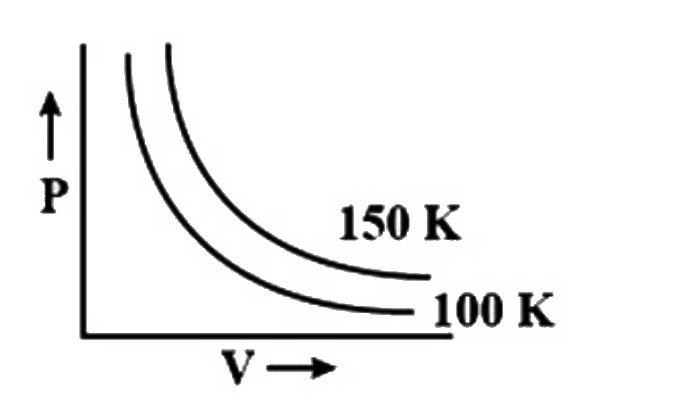The increase of pressure on ice water system at constant temperature will lead to :
a shift of the equilibrium in the forward direction
a decrease in the entropy of the system
an increase in the Gibbs energy of the systed no effect on the equilibrium
no effect on the equilibrium
The correct Answer is:A
To solve the question regarding the effect of increased pressure on the ice-water system at constant temperature, we can follow these steps:
1. Understand the System: The system consists of ice and water in equilibrium. The equilibrium reaction can be represented as:
Ice (s)⇌Water (l)
2. Effect of Pressure on Equilibrium: According to Le Chatelier's principle, if a system at equilibrium is subjected to a change in pressure, the equilibrium will shift in the direction that reduces the pressure.
3. Density Consideration: Ice has a lower density than water. This means that when we apply pressure, we are effectively favoring the phase that occupies less volume.
4. Volume and Density Relationship: When pressure increases, the volume of the system decreases (since pressure and volume are inversely related). Since the mass remains constant, if the volume decreases, the density must increase.
5. Direction of Shift: Since water is denser than ice, increasing the pressure will favor the formation of water from ice. Thus, the equilibrium will shift to the right (forward direction).
6. Conclusion: Therefore, the increase of pressure on the ice-water system at constant temperature will lead to a shift in equilibrium towards the formation of water, which is the forward direction of the reaction.
Final Answer:
The increase of pressure on the ice-water system at constant temperature will lead to a shift in equilibrium towards the formation of water (forward direction).
---
Ice (s)⇌Water (l)
The increase of pressure on the ice-water system at constant temperature will lead to a shift in equilibrium towards the formation of water (forward direction).
Similar Questions
A graph is plotted between pressure and volume at different temperature. On the basis of the graph what changes will you observe in the volume if
(i) the pressure is increased at constant temperature
(ii) the temperature is decreased at constant pressure

View SolutionConsider the adsorption isotherm given below and interpret the variation in the extent of adsorption (xm) when
a. Temperature increased at constant pressure.
b. Pressure increases at constant temperature.
View Solution
Knowledge Check
When pressure is increased at constant temperature.
ARate of Haber's process decresesBsolublity of gas in a liquid incresesCsolubility of solid in a liquid incresesD2C(s)+CO2(g)⇔2CO(g), rations moves in the froward direction.The melting points of most of the solid substances increases with an increase of pressure acting on them However, ice melts at a temperature lower than its usual melting point, when the pressure increases. This is Because :
AIce is less denser than waterBPressure generates heatCThe bonds break undr pressureDIce is not a true solidThe change in Gibbs free energy (ΔG) of the system along provides a criterion for the spontaneity of a process at constant temperature and pressure. A change in the free energy of a system at constant temperature and pressure will be:
ΔGsystem=ΔHsystem−TΔSsystem
At constant temperature and pressure:
ΔGsystem<0 (Spontaneous)
ΔGsystem=0 (equilibrium)
ΔGsystem>0 (non-spontaneous)
Free energy is related to the equilibrium constant as:
ΔG∘=2.303RTlog10Ke.
Q. For a reaction to be spontaneous at all temperature.AΔG−ve,ΔH+veandΔS+veBΔG+ve,ΔH−veandΔS+veCΔG−ve,ΔH−veandΔS−veDΔG−ve,ΔH−veandΔS+ve.
The change in Gibbs free energy of the system alone provides a criterion for the spontaneity of a process at constant temperature and pressure. A change in the free energy of a system at constant temperature and pressure will be :
ΔGsystem=ΔHsystem−TΔSsystem
For a system in equilibrium, ΔG=0, under conditions of contant....
View SolutionThe melting point of most of the solid substances increases with an increase of pressure acting on them . However , ice melts at a temperature lower than its usual melting point when the pressure increases . This is because :
View SolutionThe m.p. of most of the solid substances increase with an increase of pressure . However ice melts at a temperature lower than its usual melting point when pressure is increased. This is because
View SolutionThe melting point of most of the solid substances increases with an increase of pressure acting on them . However , ice melts at a temperature lower than its usual melting point when the pressure increases . This is because :
View SolutionThe melting point of most of the solid substances increases with an increase of pressure acting on them . However , ice melts at a temperature lower than its usual melting point when the pressure increases . This is because :
View Solution
